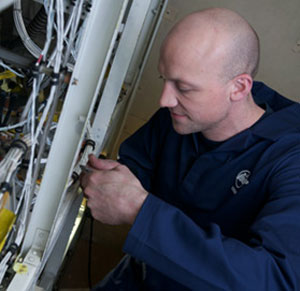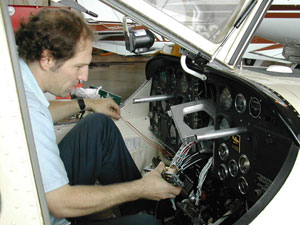Avionics Engineering Tradesperson
Tasks & duties

Avionics engineering tradespeople:
-
ensure that aircraft electronic and electro-mechanical systems (including oxygen and cabin pressure) are working correctly and meet all regulatory and safety requirements
-
consult wire diagrams, manuals and service bulletins from an aircraft's manufacturer to see how the aircraft's components should be wired
-
maintain the electronic and electro-mechanical systems in aircraft
-
replace or repair faulty components
-
install, wire, remove and replace equipment
-
test all the electronic systems and aircraft components before the aircraft returns to service
-
keep records of maintenance and repair work
Skills & knowledge

Avionics engineering tradespeople need to have:
-
skill in diagnosing and solving electronic problems in aircraft equipment
-
up to date knowledge of aircraft equipment (including radio, radar and instruments) and aircraft electro-mechanical systems (including cabin pressure systems, oxygen equipment and altitude measuring instruments)
-
knowledge of approved repair techniques
-
knowledge of safe work practices and aeronautical safety rules, regulations and methods
-
technical skills
-
skill in reading wire diagrams
-
problem solving and decision-making skills
-
listening and communication skills
Entry requirements
To become an avionics engineering tradesperson you need to have a National Certificate in Aeronautical Engineering - Level 3. Some employers may also require their tradesperson to have Civil Aviation Authority approved Aviation Medical Certificate and a drivers licence.
Training is also available in the Royal New Zealand Air Force.
Secondary education
Three years of secondary education in English, maths and science is needed to enter tertiary training. However, Sixth Form Certificate or NCEA equivalent in maths, English and physics is preferred by most employers.
Training on the job
Technology in the aeronautical and avionics field is always changing, so training is a common part of the job. Avionics engineering tradespeople can work towards the National Certificate in Aeronautical Engineering - Level 4 (Avionics). Training is also available in the Royal NZ Airforce. Avionics engineering tradespeople regularly attend first aid and occupational safety and health courses that focus on the risks involved in working with electricity.
Useful experience
Previous experience in electronics or electrical work is useful, as is experience as a mechanic.
Video
From just a job on you tube
Related courses
Aircraft Maintenance Engineering
Electronic Engineering
Mechanical Engineering
For more information, please refer to Career Services.
Document Actions
